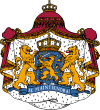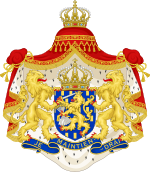- Queen's Commissioner
-
Queen's Commissioner
Commissaris van de Koningin
Coat of ArmsIncumbent
Present Queen's Commissioners:- Max van den Berg (Groningen)
- Ank Bijleveld (Overijssel)
- Clemens Cornielje (Gelderland)
- Wim van de Donk (North Brabant)
- Jan Franssen (South Holland)
- Theo Bovens (Limburg)
- John Jorritsma (Friesland)
- Karla Peijs (Zeeland)
- Johan Remkes (North Holland)
- Roel Robbertsen (Utrecht)
- Jacques Tichelaar (Drenthe)
- Leen Verbeek (Flevoland)
Appointer Dutch Cabinet Term length None Formation Dutch Constitution
1815Website provincies.nl The Queen's Commissioner (Dutch: Commissaris van de Koningin) is the head of a province in the Netherlands, who is chairman of both the Provinciale Staten (PS; the directly elected provincial parliament) and the Gedeputeerde Staten (GS; the executive branch), but only has a right to vote in the latter. When the reigning monarch is a male, the office is King's Commissioner (Commissaris van de Koning).
In the Dutch province of Limburg, the Queen's Commissioner is usually called "Gouverneur" (governor), as in Belgium. Similarly, the "Provinciehuis" (Province Hall) at Maastricht is called "Gouvernement" (Governor's Residence). This local custom arose from the particular status of the current province in the nineteenth century.
There are two levels of local government in The Netherlands: the provinces and the municipalities. The twelve provinces form the tier of administration between central government and the municipalities. The three tiers are organised in largely the same way, with a directly elected parliament, which in turn chooses the executive branch, headed by a non-democratically chosen chairman. On the national and municipal level these are the king and the mayor, on the provincial level it's the King's Commissione (it should be noted though that the king has no political power, the 'political head of state' is the Prime Minister (Minister President) similar to the United Kingdom).
Each province is governed by the Provinciale Staten ('PS'), who in turn choose the Gedeputeerde Staten ('GS'). The members of PS are elected directly every four years. Its main tasks are to decide policies and to oversee their implementation by the GS. Each member of the council has a vote and decisions are taken by majority vote of the members present. Council members usually have an ordinary job and undertake their council duties in their spare time. They receive an attendance allowance. Membership of GS is a full time job.
Contents
Tasks of the Queen's Commissioner
The Queen's Commissioner is not elected by the residents of the province, but appointed by the Dutch Crown (the ministers, presided over by the reigning king or queen), for a term of six years, which may be extended by a second term. The Queen's Commissioner can be dismissed only by the Dutch Crown. When a vacancy arises, the provincial council gives the Minister of the Interior a profile of the kind of candidate it would like to see in the job. Although all Queen's Commissioners are prominent members of one or other of the major national political parties, their actions are expected to be politically impartial while they are in office.
Queen's Commissioners play a role within the provincial administration and are the official representatives of central government in the provinces. They coordinate disaster management and prevention and pay regular official visits to the municipalities in their region.
Queen's Commissioners play an important part in the appointment of municipal mayors. When a vacancy arises, the Queen's Commissioner first asks the municipal council for its views as to a successor, then writes to the Minister of the Interior recommending a candidate. Since Queen's Commissioners are both the chairs and full members of the provincial executives, they may include some of the executive's tasks in their portfolio. They also oversee the official apparatus and any provincial utilities and represent the province in its dealings with business.
Netherlands 
This article is part of the series:
Politics and government of
the NetherlandsConstitutionCabinetDecentralized gov'tForeign policyRelated subjects
Queen's Commissioners
Province Commissioner Assumed office Duration Party Born Drenthe Jacques Tichelaar May 1, 2009 2 years, 205 days Labour Party January 2, 1953 Flevoland Leen Verbeek November 1, 2008 3 years, 21 days Labour Party March 5, 1954 Friesland John Jorritsma May 16, 2008 3 years, 190 days People's Party for Freedom and Democracy September 16, 1956 Gelderland Clemens Cornielje August 31, 2005 6 years, 83 days People's Party for Freedom and Democracy June 10, 1958 Groningen Max van den Berg September 1, 2007 4 years, 82 days Labour Party March 22, 1946 Limburg [1] Theo Bovens June 30, 2011 0 years, 145 days Christian Democratic Appeal October 1, 1959 North Brabant Wim van de Donk October 1, 2009 2 years, 52 days Christian Democratic Appeal May 17, 1962 North Holland [2] Johan Remkes July 1, 2010 1 year, 144 days People's Party for Freedom and Democracy June 15, 1951 Overijssel [3] Ank Bijleveld January 1, 2011 0 years, 325 days Christian Democratic Appeal March 17, 1962 Utrecht Roel Robbertsen June 1, 2007 4 years, 174 days Christian Democratic Appeal October 6, 1948 Zeeland Karla Peijs March 9, 2007 4 years, 258 days Christian Democratic Appeal September 1, 1944 South Holland Jan Franssen May 3, 2000 11 years, 203 days People's Party for Freedom and Democracy June 11, 1951 References
- ^ (Dutch) Theo Bovens aanbevolen als nieuwe Commissaris van de Koningin Limburgsecourant.nl
- ^ (Dutch) Johan Remkes voorgedragen als nieuwe commissaris van de Koningin North Holland
- ^ (Dutch) Ank Bijleveld commissaris van de Koningin in Overijssel Trouw
External links
- (Dutch) Official site
Water boards Municipal Submunicipal Submunicipalities of Amsterdam · Submunicipalities of Rotterdamspecial municipalities Island council · Governing council · Lieutenant governorCategories:- Government of the Netherlands
- Dutch monarchy
Wikimedia Foundation. 2010.
